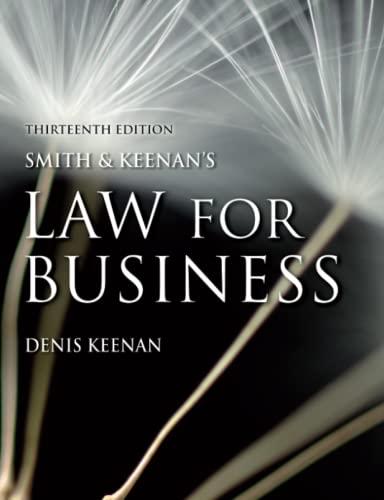Answered step by step
Verified Expert Solution
Question
1 Approved Answer
2 Supreme Court Cases to access online, read and answer the following questions. Access these by Googling either the case name, or the numbers following
2 Supreme Court Cases to access online, read and answer the following questions. Access these by Googling either the case name, or the numbers following the case name. Good cites for finding the cases will be Oyez.org, Justia.com, Findlaw.com, Oyez.org is particularly useful because it will give you easy options for finding the Syllabus (which is a brief summary of the case), or the entire case, and in some instances you can even listen to oral arguments which were presented to the Supreme Court. Remember, the "Syllabus" is a brief summary frontloaded at the beginning of the case. Sometimes it is labelled "Syllabus" and sometimes it is just a preliminary paragraph. 1. Lucas v. South Carolina Coastal Council, 505 U.S. 1003 (1992). This is another Takings case that found its way all the way to the Supreme Court. This was a 6-3 decision. It is an extremely long case, so rely on the syllabus or summaries available to answer the questions. a. What is the issue the Court is being asked to decide? b. What is the argument that the South Carolina Coastal Council is making to justify the "taking?" c. What is the argument of Lucas to dispute the taking of the property? d. Who wins? What is the Court's rationale for their decision? e. Do you agree with the Supreme Court's decision? 2. Pierce v. Society of Sisters, 268 U.S. 510 (1925). This is not a Takings case, however, it is a valuable case even though it is very old, because it clarified a number of constitutional standards. Although it is almost a hundred years old, it is still a relevant case and has had a profound affect on the evolution of civil liberties. It was a unanimous 9-0 decision. a. What is the issue the Court is being asked to decide? b. What is the argument of Pierce (who is the governor of Oregon and represented the state's defense of the law in question)? c. What is the argument of the Society of Sisters in disputing this law? d. Besides their primary argument and dispute before the Court, what are some of the larger, broader issues and applications that you see flowing from this case? e. What "level of scrutiny" would be applied to this case?8
Step by Step Solution
There are 3 Steps involved in it
Step: 1

Get Instant Access to Expert-Tailored Solutions
See step-by-step solutions with expert insights and AI powered tools for academic success
Step: 2

Step: 3

Ace Your Homework with AI
Get the answers you need in no time with our AI-driven, step-by-step assistance
Get Started


